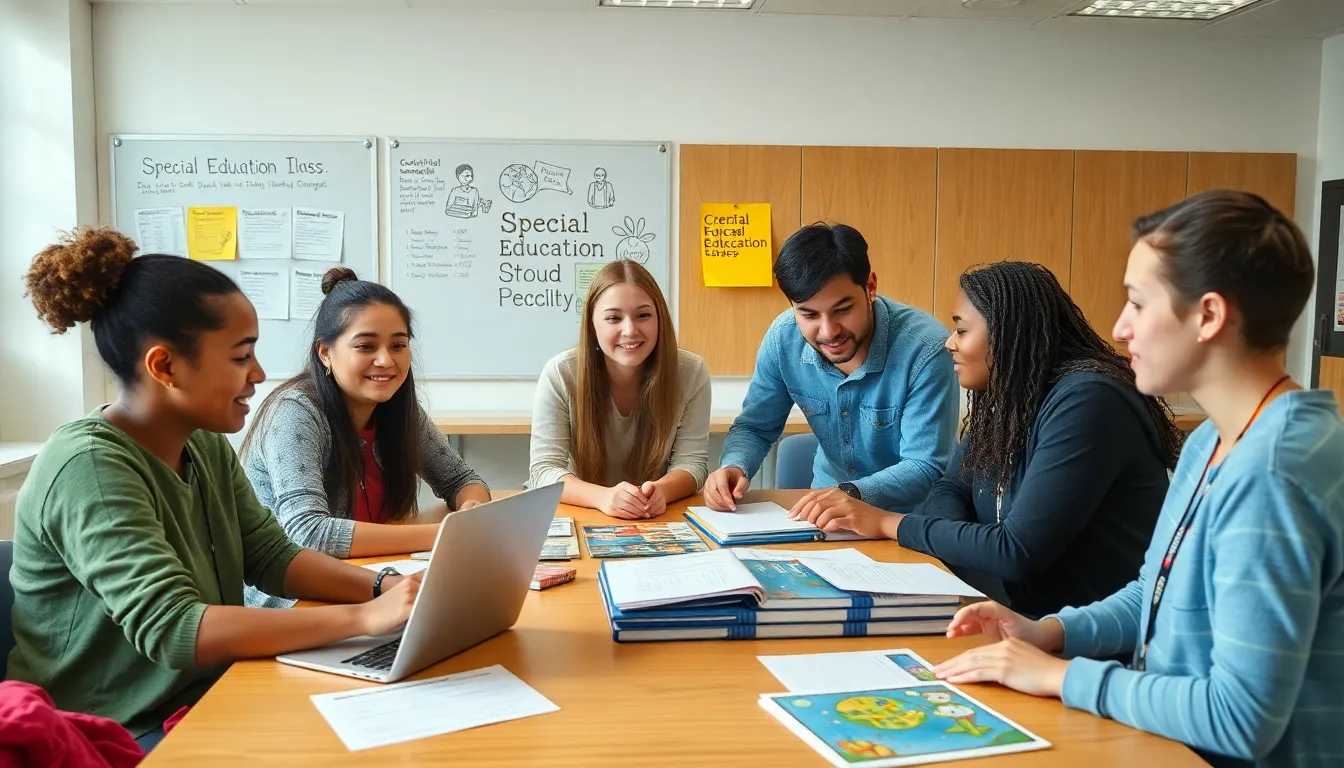Navigating the world of higher education can feel like trying to find a needle in a haystack, especially when it comes to special education colleges. These institutions aren’t just places for learning; they’re vibrant communities where future educators discover how to unlock the potential of every student, no matter their unique challenges. With a mix of expert faculty and hands-on experiences, special education colleges prepare graduates to make a real difference in the lives of those who need it most.
Imagine a classroom where every student feels valued and understood. That’s the magic of special education. Whether it’s mastering the art of individualized lesson plans or learning the latest in assistive technology, students in these programs are armed with tools to change lives. So, if you’re ready to dive into a rewarding career that’s both impactful and fulfilling, special education colleges might just be your golden ticket.
Special Education College
Special education colleges play a vital role in preparing educators to work with students facing unique challenges. These institutions focus on equipping future teachers with the knowledge and skills needed to foster inclusive learning environments.
Definition and Purpose
Special education college refers to programs designed to train individuals to become effective educators for students with disabilities. Graduates emerge with expertise in personalized strategies, interventions, and classroom management techniques. The primary purpose involves enhancing educational access and success for all learners. These colleges support the development of customized educational approaches that cater to diverse learning needs.
Importance for Students with Disabilities
For students with disabilities, special education colleges create pathways to equitable education opportunities. Effective training prepares educators to implement tailored instructional methods. These methods help in promoting academic success and social integration. Educators learn to use assistive technology, ensuring that all students can participate actively in learning. Enhanced understanding ultimately leads to improved outcomes for individuals facing various challenges.
Types of Programs Offered

Special education colleges provide diverse programs tailored to meet various educational needs. These programs equip future educators with specialized skills essential for supporting students with disabilities.
Undergraduate Degree Programs
Undergraduate degree programs focus on foundational knowledge and practical skills in special education. Students engage in coursework covering child development, cognitive disabilities, and instructional strategies. Hands-on experiences like internships and practicums allow them to apply theory in real classroom settings. Graduates obtain a bachelor’s degree in special education, enabling them to work as teaching assistants or pursue licensure as special education teachers.
Graduate Degree Programs
Graduate degree programs delve deeper into advanced concepts in special education. Participants explore topics such as behavior analysis, special education law, and curriculum design. Coursework involves research projects and seminars that enhance theoretical understanding and application. Many graduate programs offer specializations in areas like autism spectrum disorders or learning disabilities. Earning a master’s degree or higher often leads to leadership roles or positions requiring expertise in special education strategies and advocacy.
Admission Requirements
Admission requirements for special education colleges involve several key components. Interested applicants must meet specific criteria to ensure they are prepared for the challenges of this field.
Academic Qualifications
Most programs require a high school diploma or equivalent. Many institutions look for a minimum GPA, often around 2.5 to 3.0 on a 4.0 scale. Completing prerequisite courses in education or psychology proves beneficial. For graduate programs, a bachelor’s degree in a related field is typically necessary. Additionally, applicants may need to submit standardized test scores, such as the GRE, especially for master’s programs. Strength in coursework related to special education enhances candidates’ applications.
Application Process
Completing an online application is the first step in the process. Applicants often need to provide official transcripts from their previous schools. Letters of recommendation from educators or supervisors support applications significantly. A personal statement detailing motivation and experiences can set candidates apart. After submitting applications, some colleges require interviews to assess fit. Finally, applicants should be prepared for a background check, ensuring they meet safety standards for working with vulnerable populations.
Support Services Available
Special education colleges provide various support services to enhance student success. These services address the unique needs of students, ensuring they receive comprehensive assistance throughout their educational journey.
Counseling and Academic Advising
Counseling services help students navigate personal challenges while pursuing their degrees. Trained professionals offer guidance on academic goals, mental health, and stress management. Academic advising supports course selection and degree planning for timely completion. Advisors encourage students to explore their interests and align them with career aspirations. These services create an environment that fosters personal growth and academic achievement.
Accessibility Resources
Accessibility resources ensure equal educational opportunities for all students. Institutions provide accommodations tailored to individual needs, such as extended test-taking time, note-taking assistance, or priority registration. Assistive technology, like screen readers and speech-to-text software, enhances learning experiences. Training on using these tools often accompanies resource access, empowering students to thrive. These services remove barriers to learning and promote a more inclusive academic setting.
Career Opportunities After Graduation
Special education graduates access diverse career pathways that enable them to make a significant impact. Various positions await these skilled individuals upon completion of their studies.
Teaching Positions
Teaching roles represent a primary avenue for special education graduates. They often find employment as special education teachers, where they create tailored lesson plans. Many also become resource teachers, supporting students with disabilities in inclusive classrooms. Alternatives include working as teaching assistants, helping certified educators in managing classroom activities. With experience, graduates can transition into leadership positions, such as instructional coordinators or school administrators. Opportunities exist across different educational settings, including public schools, private institutions, and specialized facilities.
Related Fields
Graduates may explore related fields that leverage their expertise in special education. Positions in educational consulting allow them to advise schools on best practices. Some enter advocacy roles, promoting policies that support inclusive education for students with disabilities. Others pursue careers in occupational therapy or speech-language pathology, providing direct services to learners. Nonprofits focused on disability rights also seek graduates for coordination or community outreach roles. These diverse opportunities highlight the versatility of a degree in special education, equipping graduates to create positive change in various settings.
Conclusion
Special education colleges play a crucial role in shaping the future of education for students with disabilities. By equipping aspiring educators with the knowledge and skills needed to create inclusive learning environments, these institutions foster a generation of teachers ready to make a difference. The combination of expert instruction and practical experience ensures that graduates are prepared to face the challenges of the classroom.
With a variety of programs and support services, special education colleges provide a comprehensive pathway for those passionate about advocating for equitable education. As graduates enter diverse careers, they carry with them the tools to promote academic success and social integration for all learners. Their commitment to empowering students with unique challenges will undoubtedly leave a lasting impact on the educational landscape.

